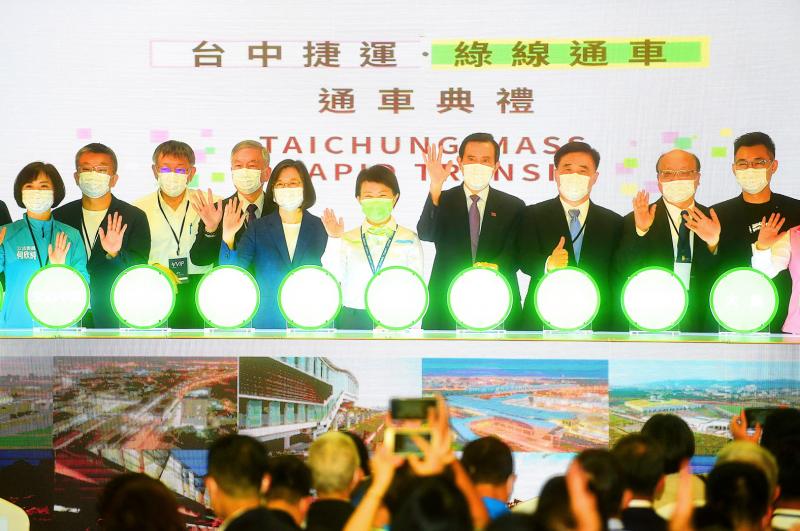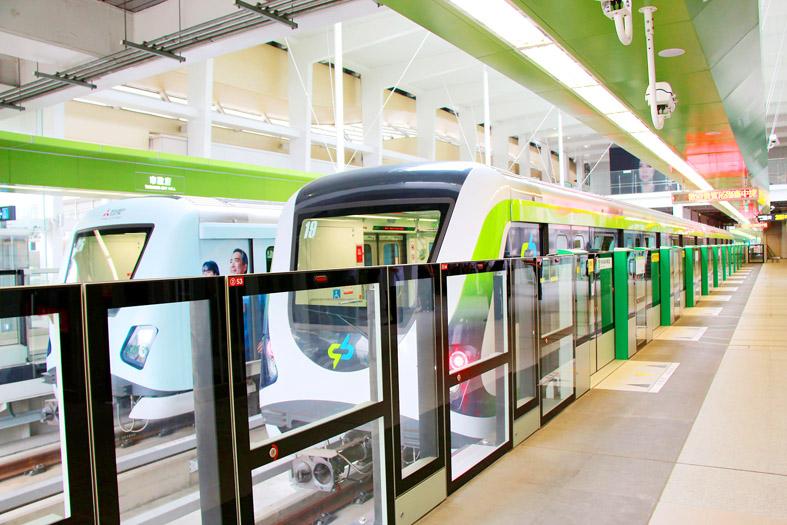Taichung has officially entered the Mass Rapid Transit (MRT) age with the city’s Green Line beginning full service at noon yesterday, President Tsai Ing-wen (蔡英文) said.
Tsai in an address said that Taichung residents were witnessing history in the making, as the metropolitan rail system has been a dream of local residents for more than 30 years.
“The official beginning of service on the Green Line shows that collaboration between the central and local governments can get things done,” she said.

Photo: Liao Yao-tung, Taipei Times
The Green Line would be extended to Taichung’s Dakeng (大坑) and nearby Changhua County, and a second line, called the Blue Line, is also being planned as part of a broader project to enhance public transportation in central Taiwan, Tsai added.
Taichung Mayor Lu Shiow-yen (盧秀燕) lauded the city as having the first MRT system south of Taoyuan and north of Kaohsiung.
The system marks a new era of public transport for Taichung and central Taiwan as a whole, Lu said.

Photo: CNA
She pledged that her government would continue to focus on safety as the top priority for the city’s MRT system.
People who rode the Taichung MRT on its first day of operations expressed satisfaction with the service.
A woman surnamed Chien (簡) traveling to the National Taichung Theater said that taking the Green Line saved her a lot of time and money, as she would have otherwise taken a bus or taxi.
A man surnamed Hsu (徐) said that people with the Senior EasyCard qualify for a 50 percent discount on ticket prices, and he and his wife plan to use the MRT service regularly.
The basic fare on the Green Line is NT$20 (US$0.71), with the fare increasing NT$5 for every 2km traveled, up to a maximum of NT$50, Taichung MRT Corp has said.
There are 18 stations along the 16.71km line from Beitun Main Station in the northeast to Taichung High Speed Rail Station in the southwest. A full journey takes about 32 minutes.
Construction of the line began in 2009 under then-Taichung mayor Jason Hu’s (胡志強) administration. The project cost NT$59.3 billion, NT$32.8 billion of which was provided by the central government.
The beginning of commercial services was originally scheduled for Dec. 19 last year, but was postponed due to mechanical problems.
Initial test runs were suspended six days after they began on Nov. 16 when it was found that the couplings between the carriages had not been installed properly.

DAREDEVIL: Honnold said it had always been a dream of his to climb Taipei 101, while a Netflix producer said the skyscraper was ‘a real icon of this country’ US climber Alex Honnold yesterday took on Taiwan’s tallest building, becoming the first person to scale Taipei 101 without a rope, harness or safety net. Hundreds of spectators gathered at the base of the 101-story skyscraper to watch Honnold, 40, embark on his daredevil feat, which was also broadcast live on Netflix. Dressed in a red T-shirt and yellow custom-made climbing shoes, Honnold swiftly moved up the southeast face of the glass and steel building. At one point, he stepped onto a platform midway up to wave down at fans and onlookers who were taking photos. People watching from inside

A Vietnamese migrant worker yesterday won NT$12 million (US$379,627) on a Lunar New Year scratch card in Kaohsiung as part of Taiwan Lottery Co’s (台灣彩券) “NT$12 Million Grand Fortune” (1200萬大吉利) game. The man was the first top-prize winner of the new game launched on Jan. 6 to mark the Lunar New Year. Three Vietnamese migrant workers visited a Taiwan Lottery shop on Xinyue Street in Kaohsiung’s Gangshan District (崗山), a store representative said. The player bought multiple tickets and, after winning nothing, held the final lottery ticket in one hand and rubbed the store’s statue of the Maitreya Buddha’s belly with the other,

‘NATO-PLUS’: ‘Our strategic partners in the Indo-Pacific are facing increasing aggression by the Chinese Communist Party,’ US Representative Rob Wittman said The US House of Representatives on Monday released its version of the Consolidated Appropriations Act, which includes US$1.15 billion to support security cooperation with Taiwan. The omnibus act, covering US$1.2 trillion of spending, allocates US$1 billion for the Taiwan Security Cooperation Initiative, as well as US$150 million for the replacement of defense articles and reimbursement of defense services provided to Taiwan. The fund allocations were based on the US National Defense Authorization Act for fiscal 2026 that was passed by the US Congress last month and authorized up to US$1 billion to the US Defense Security Cooperation Agency in support of the

HIGH-TECH DEAL: Chipmakers that expand in the US would be able to import up to 2.5 times their new capacity with no extra tariffs during an approved construction period Taiwan aims to build a “democratic” high-tech supply chain with the US and form a strategic artificial intelligence (AI) partnership under the new tariffs deal it sealed with Washington last week, Taipei’s top negotiator in the talks said yesterday. US President Donald Trump has pushed Taiwan, a major producer of semiconductors which runs a large trade surplus with the US, to invest more in the US, specifically in chips that power AI. Under the terms of the long-negotiated deal, chipmakers such as Taiwan Semiconductor Manufacturing Co (TSMC, 台積電) that expand US production would incur a lower tariff on semiconductors or related manufacturing